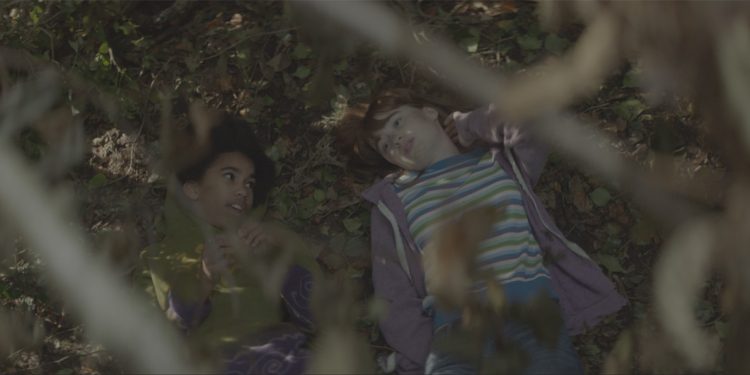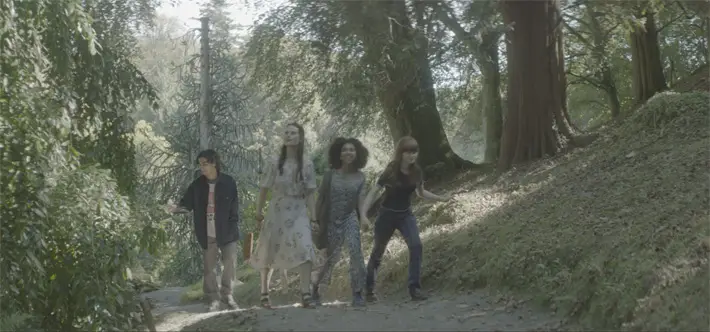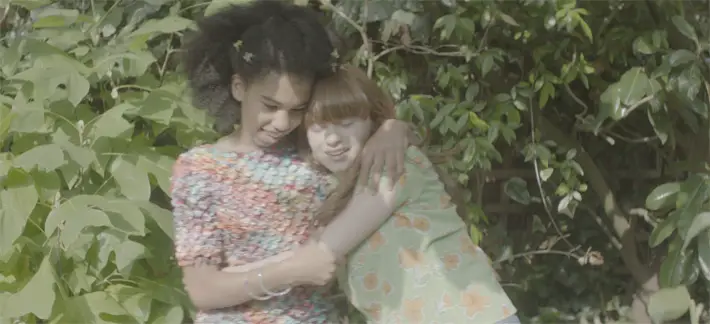Summer in the Shade (2020) – Film Review

Director: Alice Millar
Cast: Niamh Walter, Nyobi Hendry, Rebecca Palmer
Certificate: 15
By Elizabeth Stanforth-Sharpe
Alice Millar has found her cinematographic and directing niche in scripts that explore the concepts of loss and navigating life changes, in a career spanning over ten years. In her most recent works, a sculptor has to tread the fine line between perseverance and defeat when she loses the mobility in her hands (Hands, directed and written by Zara Burdett, cinematography by Alice Millar; 2015), and a young alcoholic attempts to heal the rift with her family when her sister is left paralysed by a drunk driver (Crossroads of America, written by Laura Sampson Hemingway, directed by Gabrielle Muller, cinematography by Alice Millar; 2020). Summer In The Shade, also released in 2020, is written by Isobel Boyce, but Alice Millar steps out from behind the camera to direct and produce the film, and although the theme of transition through something lost is still there, it has a much darker resonance.
The year is 1997, and the story begins with 12-year-old Grace (Niamh Walter) being read a bedtime story by her father who is under the covers with her. His choice of a tale to lull her into sleep is Homer’s account of Penelope grieving her long separation from Odysseuss, through the Trojan Wars, determined to remain faithful as the years go by. The father (Rupert Shelbourne) tells of how Penelope’s sadness grew, checking with his daughter, “Are you still listening Gracie?”, and then with the line, “Penelope did not know if Odysseuss was alive or dead”, he promptly switches off the light. As soon as he is gone from the room, Grace jumps out of bed, catches up a rosary and kneels to pray fervently. It’s an unsettling beginning.
Grace is typical of pubescent girls of that era. Her mirror is covered in sparkly stickers, she has bottles of nail varnish set amongst the numerous soft toys, holds Princess Diana as her aspirational model, scribbles in her secret diary, still enjoys playing skipping and hand clap games with her best friend, Asta (Nyobi Hendry) , but has also become body conscious, aware and afraid of the tensions between her parents, and has begun to seek a higher meaning in life, finding comfort in the Virgin Mary and the continual repetition of the ancient paternoster ‘Four corners to my bed’. She is poised one foot in childhood, one foot on the verge of womanhood. When her father leaves the house, Grace prefers to spend more time outside than face her mother Jenny’s (Fiona Gillies) distress.
“Exacerbates her fears”
Asta is a few months younger and still very much planted in the innocence of childlike activities but has acquired a taste for all things supernatural from her hippy mum Kate (Rebecca Palmer). When Kate invites Grace to join her and Asta for a summer in Cornwall, Grace is introduced to alcohol, open sexuality, succubus, smudging, the Ouija, occult practices, tarot readings and the concept of human sacrifices, all of which are in complete contrast to her own sheltered background, and, in the main, exacerbates her fears. Dead rabbits are used as a symbol throughout the film, echoing the pagan beliefs of the animal being a tool of transformation, shapeshifting, and rebirth. Strange runes appear on walls in the holiday home, and the almost continual presence of ‘white noise’ throughout the film adds to the creepy atmosphere. The girls discuss menstruation beneath cyclical moons, strip bark from trees and build a den in the local woods. Grace’s face becomes ever more marked with the tribal paints of mud, lichen and blood as the action unfolds, and is seen mixing potions of soil and leaves. The day they attack the man who has slept in their den, Grace loses her rosary; prayers for protection have been replaced with primal savagery.
The stranger Sid (Zaqi Ismail) is the most stable voice in the situation, but he too has his flaws.
When Grace gets her period, it seems, for a fraction of time, that she has metamorphosed into someone more adult. The dirt disappears, her clothes and make-up become more sophisticated, and sexuality is aroused. She invites Asta to a ‘goodbye celebration’ on the last night of the holiday. No spoilers, but what follows shows she is seriously disturbed by the summer’s events. Kate drives them home in silence, a soft toy rabbit lying on the dashboard.
“Interesting touchpoints”
Speaking of the film, Alice Millar said, ‘Summer In The Shade is an exploration into the trauma of puberty and the experience of self-disgust experienced by most women as they deal with changing from a little girl to a sexualized being. Universally this is a difficult time and for many, is accompanied by deep psychological fear and existential revulsion. The body swells and starts to bleed. Often, men look at you with hunger rather than affection and women with jealousy rather than protection in their eyes. In the vivid imagination of our protagonist Grace, who is also dealing with her father abandoning her family for the cliche of a younger woman, these themes lead her to see religion as a comfort. However, the religion she finds merely reinforces a sense of shame and guilt, as well as igniting fears of supernatural and biblical terrors, demons, original sin and the concept of participating in evil. I believe this experience is fairly universal, and it is important that it is dealt with and acknowledged in the cultural consciousness, as the ramifications of this time can affect an entire life.’
I get that. I really do, but the reality is that most girls in the world negotiate these stages in their life with alacrity and common sense without being drawn into demonic possession and midnight trips into the woods. The first time I sat down to watch this, it was late evening, and I, a grown woman, was quietly disturbed by it, though I recognise that many will not be as susceptible. The film is rated 15 and I too would err on the side of caution at sharing it with too young an audience. It is not a gentle bildungsroman, nor is it the kind of film that could easily lead to a group discussion about puberty. The film is headed up as a ‘mystery’, which I think is a misnomer; a great deal was left unexplained but as a motif of the alarming threat that ribboned through from beginning to end, and perhaps better termed as psychological drama.
Summer In The Shade certainly has interesting touchpoints, but it is a Marmite film and will divide opinion. Some will love it. Some will hate it. I can’t say I was too keen, though I tried extremely hard to make myself like it, but it was clever and well-thought through, there were some nuanced performances, and I was intrigued by the unwritten parallels with Telemachus, the child of Penelope and Odysseuss, who travels to a strange place to search for the father he hardly knew.











